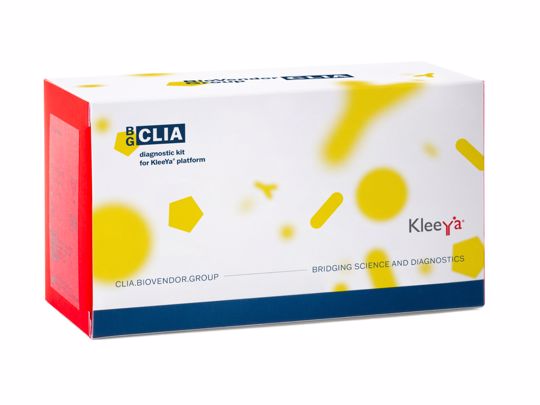CLIA Toxoplasma IgG
The chemiluminescence assay is intended for the diagnosis and screening of Toxoplasma gondii infection using IgG antibodies in human serum or plasma in the general population.
The chemiluminescence assay is intended for the diagnosis and screening of Toxoplasma gondii infection using IgG antibodies in human serum or plasma in the general population.
| Catalog Number: | CL-TgG100 |
|---|---|
| Size: | 100 tests |
| Regulatory status: | CE IVD |
| Clinical topic: | Infectious Diseases |
| Diagnostic panel: | TORCH |
| Producer: | TestLine Clinical Diagnostics s.r.o. |

Toxoplasmosis is a widespread parasitic disease caused by protozoan *Toxoplasma gondii – a parasite with a complicated life cycle consisting of several morphologically different stadia. Primary hosts are members of the feline family. Humans and most warm-blooded animals can be infected by either primarily infected food (insufficiently heat-treated meat) or by ingestion of oocysts (secondary contaminated food or contaminated fingers, objects, etc.).
Acquired toxoplasmosis in immunocompetent individuals is usually asymptomatic or can manifest itself with flu-like symptoms (subfebrility, fatigue, lymphadenopathy, muscle aches), but without lasting ill effects. Severe life-threatening infections (encephalitis, hepatitis, chorioretinitis, myocarditis, generalized form of the disease) may develop in immunocompromised patients usually because of a reactivation of a latent infection.
Congenital toxoplasmosis is caused by transmission of infection from mother to foetus. The mother has been primary infected with toxoplasmosis shortly before becoming pregnant or during pregnancy. Congenital toxoplasmosis might result in severe damages of the foetus (brain calcification, hydrocephalus, vision disorders, mental affections), still birth or abortion.
Diagnosis of the disease is based on epidemiological anamnesis, clinical manifestation and laboratory tests. Direct detection of the parasite is not available for routine diagnostics. Serology is the most important tool for laboratory diagnostics of toxoplasmosis. Screening consists in determination of total antibodies by complement fixation test (CFT). Determination of specific IgA, IgM, IgG antibodies is performed by CLIA, ELISA and confirmation of results by immunoblot method. IgA and IgM antibodies are significant markers of acute toxoplasmosis. IgM antibodies are a highly sensitive marker of acute infection, and they can persist more than 1 year. IgA antibodies can persist for 6–9 months from the beginning of infection. IgG antibodies reach maximum level in serum after 6 months from the beginning of infection and they can be detected for many years after past infection.
| Assay time | 30 min |
| Assay stability | 30 days on board stability / In use stability until the expiration date at storage temperature 2-8 °C |
| Sample matrix | Serum, Plasma |
| Sample volume | 10 µL |
| Measuring range | 0,00–320,00 IU/ml |
| Assay/kit content | Reagent Cartridge with specific reagents for the assay, magnetic particles, calibrators |
| Complementary products | Anchor® Tips, Stackable Cuvette, KleeYa Trigger Pack, KleeYa Wash buffer |
| Note | The kits are CE-IVD certified and intended for professional use. |